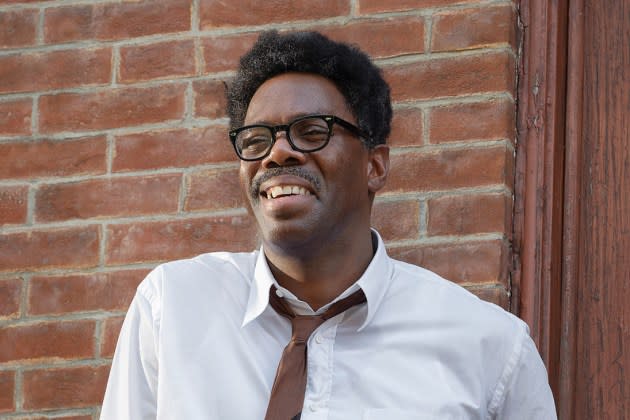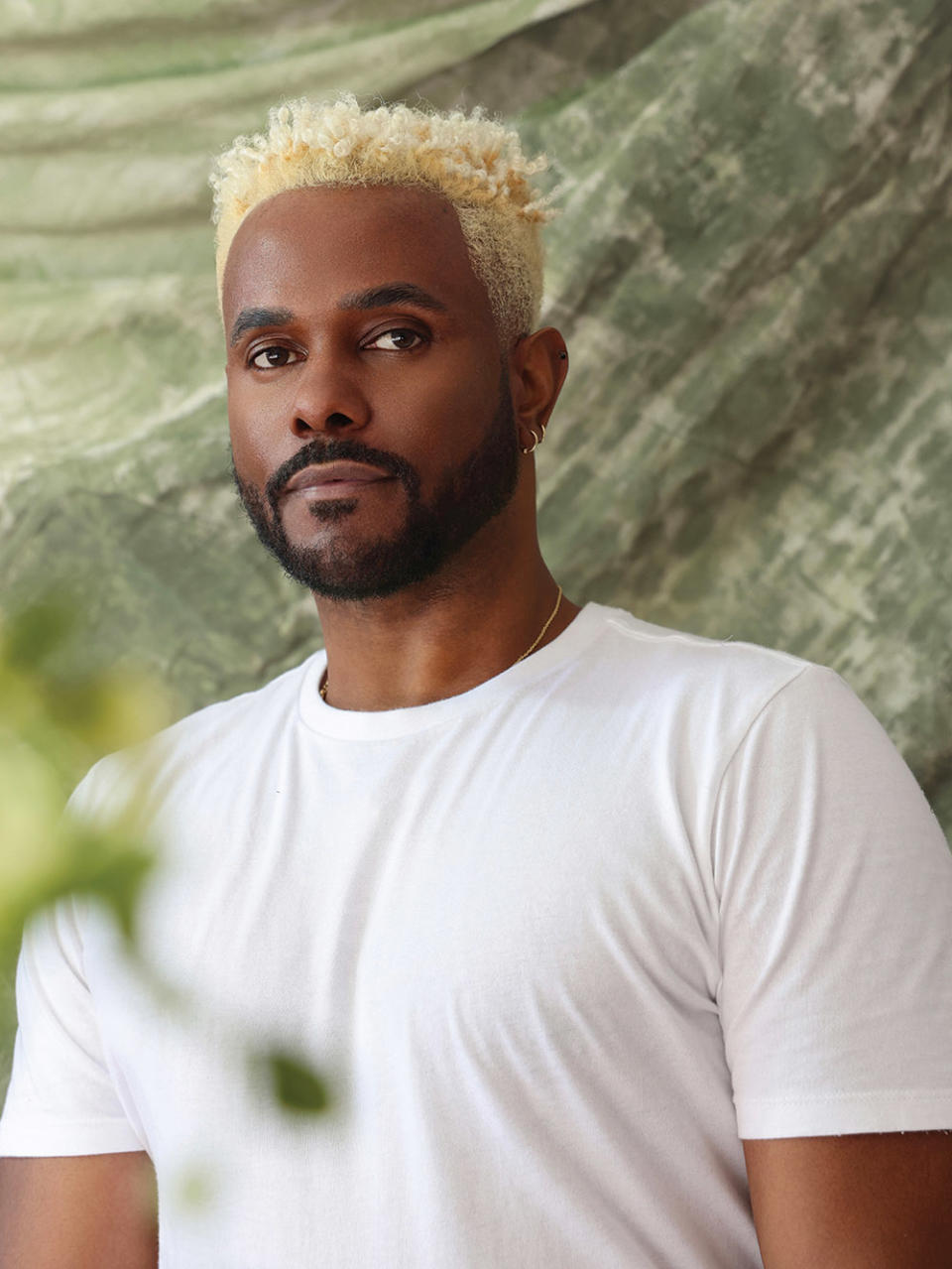‘Rustin’ Screenwriter on Bayard Rustin’s Legacy: “His Queerness Was Part of His Strategic Gift”
- Oops!Something went wrong.Please try again later.
- Oops!Something went wrong.Please try again later.

Bayard Rustin is one of the most important figures in modern American history whom many people knew nothing about — until now. Netflix’s Rustin, and its towering central performance from Emmy-winning actor Colman Domingo, serves to add his story back into the history books, particularly Rustin’s mentorship of Civil Rights leader Martin Luther King Jr. and his role as the architect of the 1963 March on Washington, where King delivered his iconic “I Have a Dream” speech.
The reason Rustin is absent from mainstream history is made all too clear in the biopic, directed by George C. Wolfe: He was openly gay and was forced to the sidelines because his sexuality was considered too taboo for public leadership — and was also seen as a threat to King’s image as other Civil Rights leaders worked to gain equality for Black Americans.
More from The Hollywood Reporter
Daytime Emmys: 'General Hospital,' 'The Kelly Clarkson Show' Among Top Winners
'The Crown' Casting Director Calls Elizabeth Debicki's Performance as Princess Diana "Perfect"
Although Rustin’s achievements have long been overlooked, co-screenwriter Julian Breece tells THR that he’s considered Rustin “a hero and a guiding light” ever since he first learned of the activist’s story as a teenager. Here, Breece speaks about how he got the job to write the screenplay, hearing Rustin’s voice in his head as he wrote it, and bringing to the forefront Rustin’s complex, and ultimately history-making, relationship with King.

When did you first learn of Bayard Rustin?
I was in high school. Of course, I did not learn about him in my classes, because he was deleted from those history books. When I was a teenager and just starting to come to terms with the gay thing, I went where we all went: to the internet, looking for other signs of a gay life. Keith Boykin, who’s a popular Black journalist and LGBTQ rights advocate, was very visible back in the early 2000s. On his blog, he would present the histories of Black queer people we may not have heard of. Bayard Rustin was one of those people. The thing that really intrigued me about Bayard was that he worked in the Civil Rights Movement, which is so closely associated with Martin Luther King. The idea that the two of them worked closely together blew my mind. When the opportunity came up to write the movie, I was like, “It has to be me.” He’s really been a hero and a guiding light for me since I was a teenager.
How did that opportunity come to you?
My manager came to me and told me Dustin Lance Black was developing the project, and he was looking for someone to write it. I was out of film school, I had a short at Sundance, I had won a few fancy screenwriting awards — but I was broke. I was temping, and writing wasn’t paying my bills. I wrote a long letter to him explaining why Bayard was important. I remember saying that his being queer added to his strategic gift. We met and hit it off, and from there I started the research process.
You spoke to a lot of people who knew and worked with Rustin. Why was that so vital to your version of his story?
I read everything I could get my hands on. The books are great, but you can get those names and contact them directly to get the emotional information you need. The first person I reached out to was Bayard’s partner, Walter Naegle. With a biographical film, the main story is more difficult to find than the personal story. With this one, it was the opposite. The person I needed to talk to first was the person who knew that story, who knew Bayard behind the man so many people described as this strong, generous mentor figure. Who did he have to talk to? What were his vulnerabilities? That’s what Walter gave me insight into.
How did you capture Rustin’s voice in your writing?
The way Bayard spoke and carried himself was all very curated. He had a vaguely Northeastern, English-y air that he put on to set himself apart, so that people paid attention to him. A lot of gay men — even out gay men — go into certain spaces and pull back on the flamboyant. But Bayard used that to his advantage, which I found so fascinating. It’s something he could turn on and off. The way he might speak before the antagonistic members of the NAACP is not the way he’d talk to his friends while he was cooking Jamaican dishes in his apartment. I was hearing Bayard’s voice in my head the whole time, and I would hear it change.
Through King’s connection with Rustin, you present a different side of King that we haven’t really seen on film before. What were the challenges of depicting that friendship?
I love the arc of their relationship — it’s a master-novice, father-son relationship that a lot of people don’t know about. Martin Luther King looked up to Bayard Rustin and knew he had a brilliant mind. Bayard was worldly in ways Martin wasn’t. Martin was this magnificent, once-in-a-lifetime leader whom Bayard was able to identify and nurture. King was so young then, and no one wants to feel like you’re saying negative things about him. I don’t go into writing like that; I don’t believe in villains and good guys.
Martin Luther King was human, and he was very much torn between what his calling was and his purpose to push this movement forward and bolster the progress of Black people in this country. And the person to put him into the position to do that was Rustin. He introduced King to nonviolent resistance. King has a Nobel Peace Prize because Bayard Rustin convinced him to use nonviolence as a tactic. He trusted Bayard’s mind, and Bayard was the one who told King to step out on his own as a leader. The film shows that final test — the “I Have a Dream” speech — before Bayard sends him out into the world.
In the queer community, we talk a lot about our chosen families. Do you think that element of Rustin’s life played a similar role in how he sought out King in order to mentor him?
Him being queer really sharpened his understanding of injustice. When you are on the outside, you know how the system works — you can see how far from the center everyone else is when you’re the furthest away. W.E.B. Du Bois wrote about the double consciousness that Black people have in this country, the second sight. As a Black queer person, I would say you have a third sight, another layer of being able to see the patriarchal violence that we commit every day in this country. Bayard identified as a man, and he embraced the feminine parts. The [Black] leadership would joke behind his back and call him “Sister Rustin.” But Bayard offered something to people because he was so himself and not encumbered by how one should act or think as a respectable Black man who could shepherd us into the white mainstream. King became a very liberated thinker and the leader Bayard hoped he would be. Bayard’s queerness was very specifically part of his strategic gift, and without it we wouldn’t have equality in this country as we know it now.
You talked a bit about the code-switching required of gay men. Do you think that Rustin embraced a flamboyance almost in a disarming way to make him less of a threat to the mainstream?
Within the Black community, there was actually more acceptance of queerness and gender variants. Post-slavery, and going into Jim Crow, there was a feeling that we had to accept all of us — we can’t afford to lose one of us. What changed was ultimately a collective desire to move into, and be embraced by, the white mainstream, which comes with accepting white patriarchal norms. One of them is aggressive misogyny, and homophobia falls under that. That was one of the questions I went into the movie asking myself — not even coming into, but coming out of it. What did we gain and what did we lose as a result of this progress?
What do you hope audiences take away from this film?
All the things that mattered to Bayard — and that Bayard had specific critiques of and took action against — are happening right now. There are solutions if we look at a Rustian take on how to approach certain conflicts and issues. What I hope that people gain from this film is that there are outsiders amongst us. We’re trying to roll back people’s rights. We’re fearful of the other, when that could be the very person — who lives outside the lines, and also is able to see outside them — that could deliver us out of this.
This story first appeared in a November standalone issue of The Hollywood Reporter magazine. Click here to subscribe.
Best of The Hollywood Reporter
Eight Actors Who Have Played Willy Wonka in Films and on Broadway
Martin Scorsese’s 10 Best Movies Ranked, Including 'Killers of the Flower Moon'

